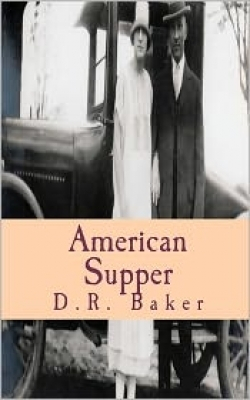American Supper
No matter what topic poets may choose to write about, their poems are rooted in the intuitions and emotions of their inner selves. Readers identify with some poems more than others, because they find their own internal intimations reflected in them. Loss of love is one of those universal experiences that few escape, and people often seek solace in poetry when going through such an experience. Even when they aren’t in the throes of losing a loved one, they are still drawn to the melancholy tone and empathize with the poem’s message.
D.R. Baker’s first collection of poetry delves into love’s loss from the rich environment of his own psyche. A graduate of the University of Arizona and a Wisconsin native, Baker has returned to his home state to live and work in health care, freelance journalism, and to write poetry.
In American Supper, Baker describes affectingly the landscape he’s traveled through in the Midwest and Southwest United States, as well as the unique sensations of a passionately inhabited inner life. He alludes to the departure of a significant woman in his life, their time together, a shared child, and his beloved’s absence. Written in blank verse, with appealingly melodic rhythm, some of these poems end with surprising conclusions that capture reader interest. The poet expresses both great despair and tentative hope as he moves through the labyrinth of self, searching for meaning in circumstances that meld a dreamy, imaginary world into his personal reality.
The night sky fascinates humans, offering the opportunity to contemplate a vast and mysterious universe under cover of darkness. After the sun has vanished, the poet feels more free to explore the indefinable around and within him. In “What the Stars Know,” he concludes:
Selves are for
forgetting.
But the stars, the
stars have known
All along that this
would be written.
In “The Velvet Hair,” a somewhat enigmatic poem about a woman dancing and “black chrome cowboys,” the author offers these knowing lines:
No one wants the
poet but what the
poet wants everyone
wants.
Baker uses a shorthand for words, such as “yr” for your, “w/” for with, and the equal sign for equal, which adds a unique signature to his poetic style. In “Waiting for The Woman,” his frustrations with women reach full force. He says:
There is no longer
desire when yr secret
heart is aflame.
And no one cares, no
one cares to know yr
real name.
Unusual imagery and juxtaposition of words characterize the poems in this book. The result is an entrancing lyrical style that sometimes obscures meaning. Readers who hope to understand these poems more completely may be disappointed. The author’s concentration on his difficulties with women might seem off-putting to others.
This soul-searching collection offers readers a fine opportunity to savor poems written in a well-crafted style. Those who appreciate poetry for its own sake, and for the subject matter of these poems, will find value in this book.
Reviewed by
Margaret Cullison
Disclosure: This article is not an endorsement, but a review. The publisher of this book provided free copies of the book and paid a small fee to have their book reviewed by a professional reviewer. Foreword Reviews and Clarion Reviews make no guarantee that the publisher will receive a positive review. Foreword Magazine, Inc. is disclosing this in accordance with the Federal Trade Commission’s 16 CFR, Part 255.

